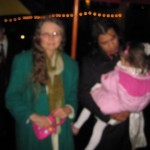Remember all the wonders of ancient Egypt, ancient Greece and ancient Rome, those amazing cradles of Western Civilization? Remember Shakespeare, Michelangelo, Newton, Copernicus and Einstein — fathers of modern science, culture and art? Do the names Thomas Jefferson, Jesus Christ and Martin Luther King Jr ring a bell — men who gave birth to our modern ideals regarding justice?
And what about Western Civilization’s many miraculous offspring — such as life-saving medicine, outstanding universities, electricity, the telephone, moving pictures, human beings landing on the moon, the airplane and central heating?
While babysitting my three-year-old granddaughter Mena the other day, I was suddenly overwhelmed by her wonderfulness. “I’m thinking that what you have produced here is probably the height of Western Civilization!” I exclaimed to my son Joe when he came to pick her up later. “Mena is smart, kind, positive, curious and creative. She’s perfect.”
And then I looked over at my son, who is the prime example of a perfect loving and caring father. “Oh hell, Joe, you are the height of Western Civilization too!”
I’m so proud to be a member of a society that can produce such outstanding, high-quality youth as these ones.
Sadly, however, what Western Civilization is really going to be the most remembered for among future historians — if there will be any left, that is — is going to be climate disaster, planet-wide radioactivity, an economic crisis of epic proportion, greedy and grubby leadership, grand-scale human subjugation, pedophilia and pornography, waterboarding, voting-machine fraud and the bloody and anonymous disfigurement and death of hundreds of thousands of innocent women and children by monstrous drones, gristly cluster bombs and nightmare-quality uranium-enhanced weaponry that maim and kill indiscriminately. http://www.independent.co.uk/news/world/politics/uk-backs-bid-to-overturn-ban-on-cluster-bombs-6259139.html
Is it too late to change?
PS: When my daughter Ashley was in first grade back in 1994, I wrote a book that her class could read in preparation for their big spring camping trip up to Tilden Park. The moral of its story was that people learn by doing — and that we are NOT stuck in our set ways forever but truly are able to change. (And also, perhaps, that if civilization as we know it is destroyed by our greedy and inept leaders, there’s still a slim chance that we might still be able to survive by living off the land?) Anyway, here’s my tale (illustrations are included below, free of charge):
Ms. Brown’s First Grade Class and the Great Outdoors
Let’s explore some of the facts we might know and the feelings we might have about city life. Let’s then compare them with the facts we might know and the feelings we might have about the Great Outdoors.
Here’s a fact: All the first graders in Ms. Brown’s class know pretty much everything they need to know regarding the rules of city life. You all know how to flush a toilet, buckle a seat belt, brush your teeth, turn on a television, get dressed, get on and off a school bus, bicycle to the corner and turn on and off the kitchen light.
You know how to make a bowl of cereal. You know how to answer the telephone, how to open the door and how to eat your vegetables. You know when bedtime is. You know when to get up. You know where to put your boots away. You know where to find the ice cream section when you go to the grocery store.
You know who to tell when you see a bad guy. You know who to ask for help with your homework. You know what to do when you are at school. You know what to do when you are at home.
You know a lot about city life.
But what about feelings? Most of you feel at home in the city. Most of you feel pretty familiar and comfortable with the rules and ways of city life. Right? Right.
Here’s a fact: There are no televisions, cars, lights, telephones, toilets, refrigerators, houses, bicycles, schools, streets or video games in the Great Outdoors. They don’t even have Barney!
Life in the Great Outdoors is very different from life in the city.
There are a lot of fun things to do in the Great Outdoors, but they are fun in a different way than the fun things you find in a city. There is dirt in the Great Outdoors. Lots and lots of dirt. There are trees. There are creeks and rivers. There are bushes, plants and grass. There is lots and lots of fresh air.
There are almost no people. There is lots of room to run around in. There is a lot of silence and a lot of interesting sounds. There are animals and birds in the Great Outdoors. And the Great Outdoors has a whole new set of rules that are completely different from the rules of city life.
But what about feelings? You might not feel familiar with this new set of rules. You might wonder how you are going to learn all the new rules of the Great Outdoors. You might feel doubtful. You might feel scared. You might feel curious. You might even feel EXCITED by the chance to learn about a new way to survive successfully in a whole new place, to go to and beat a whole new level in the game of life!
Here’s a fact: If you spend time learning about the Great Outdoors, you can learn a lot.
But what about feelings? Even if you only spend an hour or two a week learning about the Great Outdoors, sooner than you think you can learn enough to feel comfortable there — to feel as much at home in the Great Outdoors as you do in the city.
(This book is dedicated to the memory of Ms. Denise Brown, teacher extraordinaire, the best teacher ev-ah)
